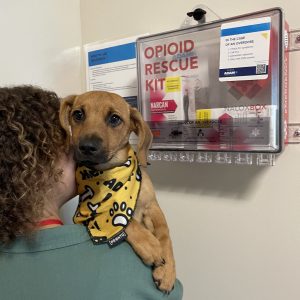As International Overdose Awareness Day approaches, the Alcohol, Drug and Mental Health Board of Franklin County (ADAMH) continues to combat the opioid crisis by expanding the Naloxbox Program in the community.
To date, over 200 NaloxBox rescue kits have been installed across Franklin County with plans for another 100 to be placed in the next year. The kits contain two doses of naloxone – a medication that rapidly reverses an opioid overdose – in an easy-to-use nasal spray, CPR masks and instructions on how to administer the medication.
“In the beginning, we placed 50 boxes in ZIP codes that were identified for having high overdose death rates in partnership with Ohio Department of Mental Health and Addiction Services,” said McKayla Elliott, ADAMH state opioid response manager. “We've expanded to placing them where overdoses are occurring and then also in public places that get a lot of foot traffic.”
Through community partnerships, NaloxBoxes can be found throughout Ohio State University’s campus, Columbus Metropolitan Library locations, Columbus Recreation and Parks community centers and more. McKayla said there’s a lot more willingness from the community to install boxes than there was when the program launched in late 2021.
“I think having marketing campaigns like Beat The Stigma, and seeing more awareness in the media has helped people understand that addiction is a medical condition that needs to be focused on and can happen to anyone,” she said.

Today, more organizations and businesses are requesting NaloxBoxes to be installed. In March, the Franklin County Dog Shelter and Adoption Center placed three boxes in and around the shelter.
“By ensuring that NaloxBoxes are readily available and accessible for all, we are not only providing life-saving resources but are also sharing the powerful message of our commitment to fostering a safer and more informed community that is better prepared to support those in crisis,” said Erin Hamill, Franklin County Dog Shelter and Adoption Center marketing and community relations manager.
There have been at least 30 reported uses of ADAMH NaloxBoxes since the program’s inception. In some of these instances, lives were saved due to naloxone being administered.
At a Columbus Metropolitan Library location on the north side of Columbus, a library security officer was prepared to support someone in crisis thanks to the NaloxBox that was on-hand. In July, an individual inside the library was unresponsive and branch staff decided administering naloxone was necessary.
“I administered it and he immediately woke up, but was agitated,” the security officer said. “Since it was my first time administering naloxone, I was a little hesitant, but then I remembered you can't overdose on it.”
The security officer had never experienced someone overdosing before but is grateful that he had to the tools and training – provided through ADAMH providers, CompDrug and Southeast Healthcare – to prepare him for the situation.
“Looking back on it, it could have been a lot worse,” he said. “I think the best thing we can do as a community is have these resources so we’re prepared for these types of situations as they come.”
Today, not only is ADAMH collaborating with large community partners but also with businesses and leaders in close-knit communities to raise awareness of the opioid crisis through NaloxBoxes. Recent businesses have included barbershops and salons, breweries and pizza places.
“It’s really cool to see the stigma around opioid overdoses being reduced and having people seek us out for partnerships instead of us going to them,” McKayla said. “To see people realize the need for this lifesaving medication is really exciting.”
